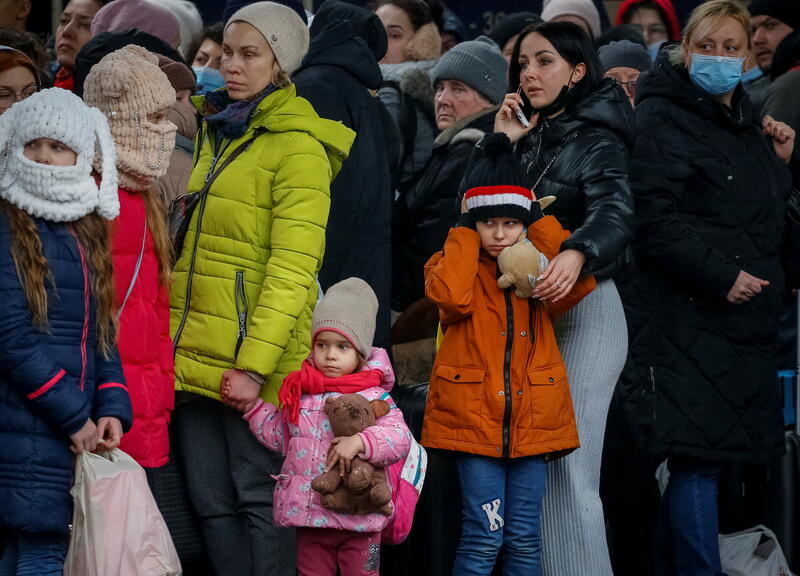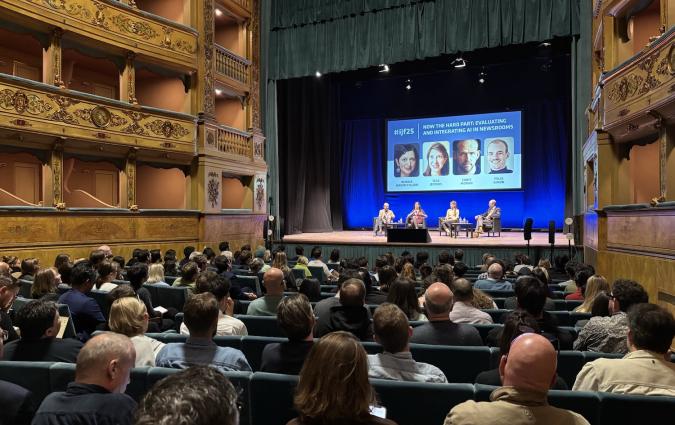As Putin's bombs fall, a journalist is raising money to keep Ukrainian news media afloat

Children wait to board an evacuation train from Kyiv to Lviv. REUTERS/Gleb Garanich
On 24 February Jakub Parusinski woke up in Riga to the news that his home country was being invaded. It was five in the morning but he wasn’t shell-shocked for long. “I understood that normal civilisation was gone and that we would need to adapt very quickly. I realised we were going to need to move many journalists out because Russia would not just invade very lightly and then decide to dance off,” he says.
Jakub has started two crowdfunding campaigns to help Ukrainian news organisations. The first one was launched back in December, when the entire editorial staff of the Kyiv Post was fired by a new owner and left to create the Kyiv Independent, a new English-language digital outlet. On the back of its brave war coverage, the team had raised more than $1 million at the time of this writing.
As Russians bombs were falling on Ukrainian cities, Jakub and his colleagues managed to create a second campaign on GoFundMe to meet any urgent needs of Ukrainian news organisations. At the time of this writing, they’ve raise more than $700,000 from thousands of people and news organisations around the world.
Jakub’s career has prepared him for this moment. He’s been a journalist, a consultant and a media manager, and he’s spent five years in Ukraine working as the editor and the CEO of the Kyiv Post at the time of Maidan, the democratic revolution that brought down the corrupt Viktor Yanukovych in 2014. “We’ve dusted off a lot of the plans we developed at the time,” he says. “We also expected Russian invasion back then.”
As his friends founded the Kyiv Independent, Jakub stepped in as acting CFO and kept helping them in the run-up to the invasion. Today he’s running a small team of volunteers who’s helping Ukrainian journalists at this time of need. “Right now, there is a mad rush to get any kind of supplies into Kyiv,” he says. “The city could be closed anywhere between 12 hours to 72 hours from now.”
On Tuesday afternoon, as a Russian missile hit Kyiv TV tower, I spoke with Jakub about his crowdfunding campaign and about the work he and his team are doing to keep Ukrainian newsrooms afloat at this difficult time. Our conversation has been edited for brevity and clarity.
Q. What do Ukrainian journalists need right now?
A. We're currently running six work streams. And these are based around specific needs. One is fundraising to make sure that we have ammunition to keep going but that’s a small part.
We're helping people get out of Ukraine. There are people waiting on the border to pick up journalists who are leaving the country. We're working with partners in Poland, Slovakia and other countries to relocate them. Top editors from Polish newspaper Gazeta Wyborcza have gone personally to the border and picked people up. [Digital newspaper] Dennik N is helping us in Slovakia and we are trying to secure accommodation and office space.
If you're a Ukrainian news outlet, you have two types of people: war correspondents and the rest. War correspondents need to be on the ground. They need to have supplies and be constantly supported. Anyone who is not a war correspondent is a liability right now if they remain in Ukraine. So we're moving everyone else out of the country. Our partners are being very useful in setting up hubs outside Ukraine.
Our most urgent need though is getting supplies into Kyiv. Right now around 40% of our resources are basically logistics, maybe even more.
Q. Which kind of supplies?
A. Bulletproof vests, helmets, tourniquets, bandages… We got a list from Ukrainian media. But we checked that list and cross-referenced with experienced war reporters. There's satellite phones, satellite internet, that kind of stuff. But also practical things like hot water bottles, menstrual pads, water filters… Things that in a week's time may be really difficult to find and without which things may get very unpleasant.
If any media organisation we can quickly verify tells us it needs $500 for gas or $700 to buy insurance, we respond generally within 20 or 30 minutes with a cash transfer.
Q. Are you supporting local or national news organisations?
A. Both. It’s important to distinguish here. For the local ones, we're working with the Media Development Foundation because they have the most experience on this. These outlets were really resource-strapped to begin with, and the war has not made things any better. Then there's a group of bigger news outlets based in Kyiv. They have a lot of people there and they're relocating. All of that is going to be unbelievably challenging. So we are talking to those national organisations that matter the most for the country providing support in terms of relocation in places like Warsaw and other things.
Q. Which organisations are involved in this effort?
A. The first one is The Fix, the news innovation website I founded that has essentially become a humanitarian organisation. All the team is involved in helping, whether it's contacting people, fundraising or connecting with publishers. Are we Europe is helping us work with donors or people who are ready to donate to this effort.
The guys at the Media Development Foundation are on the ground. They have a network of 100 news organisations. They're sourcing needs and intelligence on what's happening immediately. They are also an NGO that's focused on the media sector in Ukraine, and they're right there. They're coordinating the Polish route in terms of logistics, and we're running the Romanian route separately.
Then we have tons of volunteers who’ve stepped up. I did my MBA at INSEAD and my wife at LBS, and people from both communities are helping in so many ways.
We've been working with Ukrainian media forever. So we have contacts all across the Ukrainian media space. It doesn't matter who's running this. There is a coalition of people whose goal is to help journalists on the ground, and whatever instrument, whatever bank account, whatever organisation we can use, that's what we'll do.
Q. I’m sure there will be editors or media managers who read this article and will wonder how they can help. Are there any in-kind contributions that you need from them?
A. Publishers have been really stepping up and there are a few things they can do. They can contact us and send equipment. We have a logistical system to gather it, store it in Romania and Poland, and distribute it to wherever it needs to be.
Q. With so many reporters on the ground, someone may be wondering why we need Ukrainian journalists on the story. What would you say to them?
A. An important part of that answer is that Ukrainian outlets usually have Russian-language versions. Actually, many of them used to be Russian-first. So a lot of the Ukrainian media are still accessible in Russian and it's important for Russians and Belarusian to be able to read what’s happening now. It's not just websites. It's Viber and Telegram channels.
For Belarusians, this is a real shock. Part of their cultural identity is that they're a country that does not attack. If you look at what happened during World War II, Belarus had the worst losses per capita. Around a third of the nation was killed. It's a country that doesn't have an ounce of violence in it. The nation defines itself by this non-violence, unlike Ukrainians who are very boisterous, and they will not shy from a fight.
For Belarusians and Russians to see that their armies coming in and killing and bombing people this is this is really important. The other thing is I would say is that foreign correspondents have an important role, translating the story back home. But a society needs its journalists right there. What you're seeing in Ukraine is a real national war. The whole country, the whole society is mobilised from top to bottom. The news media plays a huge role in keeping society together and keeping them informed.
It's great that government services have social media, but that's not enough to have a civilisation. Putin and Lukashenko are trying to break Ukraine because of what it symbolises. We can't let any part of that society break and the media is such an important part.
Q. The situation is very fluid right now. What scenarios are you considering for the Ukrainian news media?
A. All of the scenarios are terrifying. Right now the siege of Kyiv is sapping all our energy, but we’ve already had some discussions about the future.
There's an optimistic scenario in which no matter how much we've planned, we're happy and we just celebrate. Then there are three unhappy scenarios. In the first one, Russia takes a big chunk of the country, but I don't think that’s actually realistic. We would have partisan warfare for a while. So we're talking more about Ireland than Belarus. The second scenario is a Donetsk People's Republic kind of scenario. The third one is something like Syria.
All of these scenarios are difficult logistically, operationally and financially. And so, whatever comes, we want to be as prepared as possible.
You can donate to Jakub's campaign to keep Ukrainian media going in this link.







